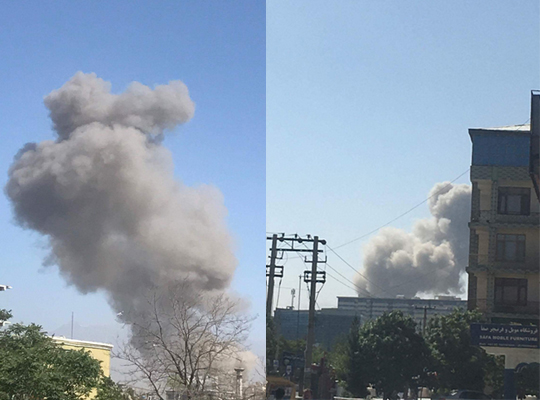Kabul, May 31: The death toll in the Kabul car bombing near the diplomatic region has climbed to 80, reports said, and so far over 320 people have been injured. A blast was reported in Kabul just fifty metres away from the Indian embassy, at around 9.30 am (IST) on Wednesday.
A statement from the Ministry of Interior Affairs says it "condemns in the strongest terms the terrorist attack" that killed so many, including women and children. The ministry did not have details on the possible target of the attack.
An eyewitness told the local Pajwok news agency that the blast took place in front of the office of the National Directorate of Security (NDS), Afghanistan's primary intelligence agency. However, CNN-news 18 reported that the site of the explosion was very close to the the German Gate, which is the entry point to the road which houses missions of several countries, the closes being the German Embassy.
Bodies littered the scene and a huge plume of smoke rose from the area which houses foreign embassies. Witnesses described dozens of cars choking the roads as wounded survivors and panicked schoolgirls sought safety, with men and woman struggling to get through security checkpoints to search for loved ones.
"A car bomb" exploded at 8:25 am, Danish said. The blast in the Wazir Akbar Khan area happened near several embassies and not far from the presidential palace.
The impact of the blast was so heavy that more than 30 vehicles in the area were either destroyed or damaged badly; houses hundreds of metres away from the blast site were damaged and windows and doors blown off their hinges. Bodies and injured people were seen in the area. Some women were seen screaming for the lost relatives at the site of explosion.
Ismail Kawasi, spokesman for the public health ministry, said more than 50 wounded people are in Kabul hospitals so far. Eye-witness said that the blast was so heavy more than 30 vehicles were either destroyed or damaged. Windows were shattered in shops, restaurants and other buildings up to a kilometer from the blast site.
Indian embassy building suffers damage
Even though, it was not immediately clear what the target was, the Indian intelligence agency has not ruled out the fact that the target of the explosion could have been the Indian mission in Afghanistan.
External Affairs Minister Sushma Swaraj tweeted about the safety of the Indian embassy staffers and Prime Minister Narendra Modi has been briefed about the incident.
By God's grace, Indian Embassy staff are safe in the massive #Kabul blast.
— Sushma Swaraj (@SushmaSwaraj) May 31, 2017
Manpreet Vohra, India's envoy to Afghanistan, told that the blast hit around 100 metres as the crow flies from India's embassy, one of several in the area.
"We are all safe, all our staff, all our personnel are safe. However, the blast was very large and nearby buildings including our own building have considerable damage in terms of broken glass and shattered windows and blown doors etc," he said.
Indian Prime Minister Narendra Modi also tweeted condemning the massive attack.
We strongly condemn the terrorist blast in Kabul. Our thoughts are with the families of the deceased & prayers with the injured.
— Narendra Modi (@narendramodi) May 31, 2017
The explosion also shattered windows at the Japanese embassy. "Two Japanese embassy staffers were mildly injured, suffering cuts", a foreign ministry official in Tokyo said. French and German embassy buildings also faced some damage.
There was no immediate claim of responsibility but the explosion comes amid heightened activity of the Taliban, which has staged a slew of deadly attacks in Afghanistan in the recent past. The Taliban has vowed to step up its annual 'spring offensive.'
The Islamic State group has also claimed responsibility for several recent bombings in the Afghan capital, including a powerful blast targeting an armoured NATO convoy that killed at least eight people and wounded 28 on 3 May.
Wednesday's attack underscores spiralling insecurity in Afghanistan, where Afghan forces beset by soaring casualties and desertions are struggling to beat back the insurgents. More than one third of the country is outside government control.
Afghan troops are backed by US and NATO forces, and the Pentagon has reportedly asked the White House to send thousands more troops to the country to break the deadlocked fight against the Taliban.
US troops in Afghanistan number about 8,400 today, and there are another 5,000 from NATO allies, who also mainly serve in an advisory capacity — a far cry from the US presence of more than 100,000 six years ago.
Pentagon chief Jim Mattis has warned of "another tough year" for both foreign troops and local forces in Afghanistan, where more than one third of the country is outside of government control.
In an incident as recent as Friday, at least 15 Afghan soldiers were killed when Taliban fighters attacked their base in Kandahar. At least 30 soldiers were killed in a similar attack in Shah Wali Kot late Monday and two days later, 13 others died in another insurgent raid in Kandahar's Maiwand district.
Besides this, incidents of attack on the Indian mission in Afghanistan have been reported in the past too. Nine people were killed in an Taliban-claimed attack in March last year after terrorists, including suicide bombers, struck the Indian consulate in Jalalabad. In January 2016, the Indian consulate in Mazar-e-Sharif in Northern Afghanistan was also attacked.
Kabul province had the highest number of casualties in the first three months of 2017 thanks to multiple attacks in the city, with civilians bearing the brunt of the violence.
This is an updating news story. More details will be added to the story as and when they are available.






Comments
Add new comment